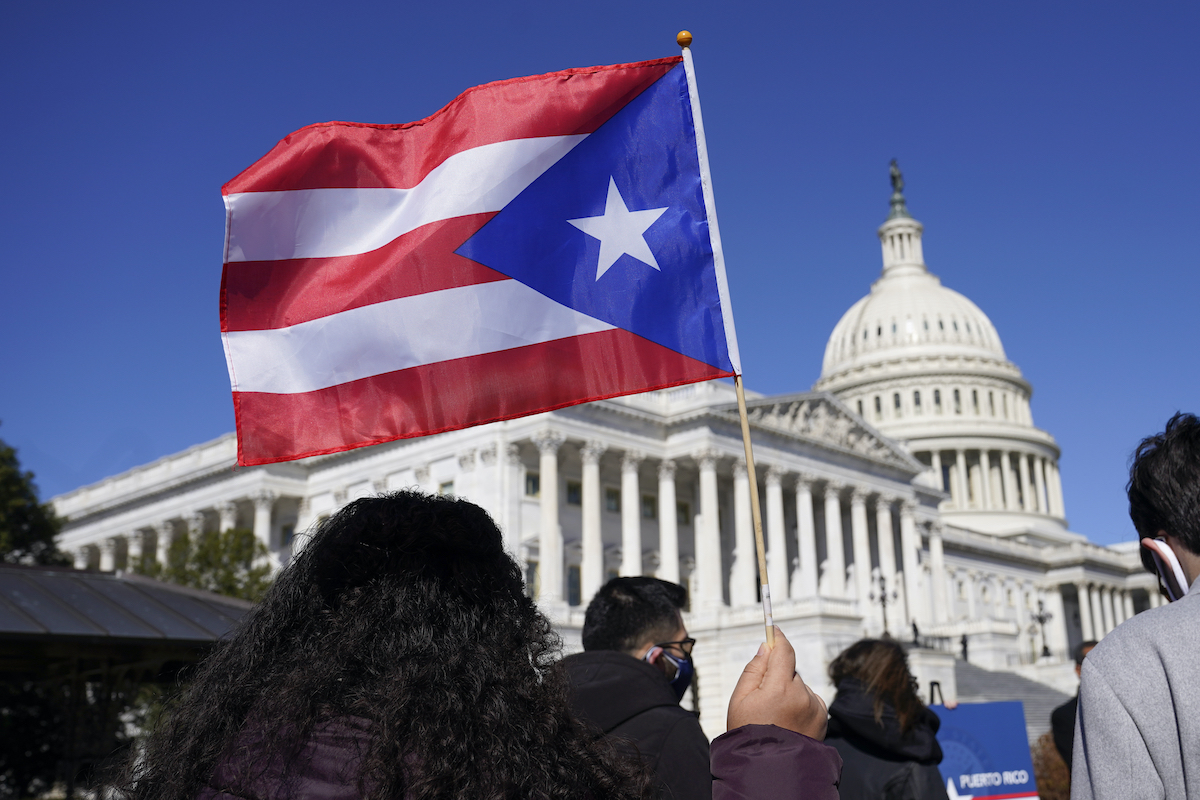

A woman waves the flag of Puerto Rico during a news conference on Puerto Rican statehood on Capitol Hill in Washington, Tuesday, March 2, 2021. (AP Photo/Patrick Semansky)
Over the last few months, the issue of Puerto Rico’s status debate has been back in the news, particularly due to the introduction of two Congressional bills (a statehood one and a self-determination one) with more than 170 bicameral and bipartisan cosponsors combined.
As with more things related to Puerto Rico’s status debate, even with both bills going through committee, there has been a deep chasm among the pro-statehood side and the self-determination side. Such is the way of how bitter and divisive the debate has become.
Until now?
In an opinion piece published Monday by the Miami Herald, two Puerto Rican professors and Congressional committee witnesses from either side of the debate (Rafael Cox-Alomar, who favors the self-determination bill, and Christina D. Ponsa-Kraus, who favors the statehood bill) said that it may be time to compromise if any serious movement on Puerto Rico were to happen.
As Cox-Alomar and Ponsa-Kraus write:
Congress should enact legislation making Puerto Ricans an offer and empowering them to trigger implementation through their acceptance (as the Statehood Admission Act would do). It must include all decolonization options (as the Self-Determination Act would do). And it must provide voters the information that true self-determination requires—as only Congress can do.
Under domestic and international law, the options are statehood, independence and a status known as free association, in which Puerto Rico’s relationship to the United States would be governed by a treaty between them. The law defines their essential features. For statehood, they include equality and representation under the U.S. Constitution. For independence and free association, they include separate sovereignty under international law.
For those observers of Puerto Rican politics, to see two “opponents” come up with a solution that might appeal to more people and legislators is important. (On the same day this opinion piece was published, Sen. Joe Manchin, the West Virginia Democrat, was calling for a constitutional amendment to admit Puerto Rico as a state.)
“Congress has the power —and the obligation— to put an end to Puerto Rico’s colonial limbo. It should do so without delay,” the opinion piece concluded.
With more than 170 cosponsors who have signed to either one bill or another, can a compromise be the next step?
According to Cox-Alomar and Ponsa-Kraus, the answer is yes.
***
Julio Ricardo Varela is founder and publisher of Latino Rebels, part of Futuro Media. He tweets from @julito77.



While I personally favor statehood as the definitive solution to Puerto Rico’s seemingly intractable status conundrum I believe in a fair, equitable and transparent self-determination process that allows supporters of all three traditional options (statehood, independence and free association) to participate and be heard and to have their favored alternative on a binding Federally-mandated ballot because I recognize that there are honest and sincere people in all three camps. In that sense I’m elated that two distinguished scholars like Prof. Ponsa-Kraus and attorney Cox-Alomar appear to be on track to agree on at least some form of inclusive procedural mechanism to address the problem. The real stumbling block, however, has always been Congress’s reluctance to tackle the Puerto Rico issue in a serious and responsible manner. I’m keeping my fingers crossed that the powers that be in Washington, D.C. will live up to their legal and moral responsibility after 123 years of colonial overlordship over the U.S. territory of Puerto Rico, but judging from previous efforts in that regard I’m not holding my breath.
[…] two prominent Puerto Rican legal scholars on both sides of the political status debate argued for a compromise bill, explaining that Congress must act on resolving Puerto Rico’s current territorial status, […]
[…] two prominent Puerto Rican legal scholars on both sides of the political status debate argued for a compromise bill, explaining that Congress must act on resolving Puerto Rico’s current territorial status, which […]
[…] two distinguished Puerto Rican authorized students on either side of the political standing debate argued for a compromise bill, explaining that Congress should act on resolving Puerto Rico’s present territorial standing, […]